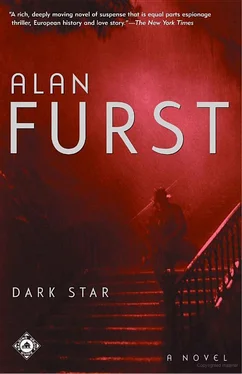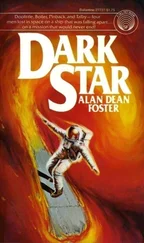Alan Furst - Dark Star
Здесь есть возможность читать онлайн «Alan Furst - Dark Star» весь текст электронной книги совершенно бесплатно (целиком полную версию без сокращений). В некоторых случаях можно слушать аудио, скачать через торрент в формате fb2 и присутствует краткое содержание. Жанр: Шпионский детектив, на английском языке. Описание произведения, (предисловие) а так же отзывы посетителей доступны на портале библиотеки ЛибКат.
- Название:Dark Star
- Автор:
- Жанр:
- Год:неизвестен
- ISBN:нет данных
- Рейтинг книги:3 / 5. Голосов: 1
-
Избранное:Добавить в избранное
- Отзывы:
-
Ваша оценка:
- 60
- 1
- 2
- 3
- 4
- 5
Dark Star: краткое содержание, описание и аннотация
Предлагаем к чтению аннотацию, описание, краткое содержание или предисловие (зависит от того, что написал сам автор книги «Dark Star»). Если вы не нашли необходимую информацию о книге — напишите в комментариях, мы постараемся отыскать её.
Dark Star — читать онлайн бесплатно полную книгу (весь текст) целиком
Ниже представлен текст книги, разбитый по страницам. Система сохранения места последней прочитанной страницы, позволяет с удобством читать онлайн бесплатно книгу «Dark Star», без необходимости каждый раз заново искать на чём Вы остановились. Поставьте закладку, и сможете в любой момент перейти на страницу, на которой закончили чтение.
Интервал:
Закладка:
At Abramov’s direction, he attended a series of training schools- an endless repetition of dead-drops, codes and ciphers, forgery, and the construction of false identities. It was all about paper, he realized, a world of paper. Identity cards, passports, embassy cables, maps of defensive positions, order-of-battle reports. A mirror image of a former life, when he’d also lived amid paper.
Sometimes he wrote for Nezhenko; Abramov insisted on that. Stories about progress, always progress; life was getting better and better. What did such drudgery do to the secret spirit that he imagined lived deep within him? Curiously, nothing. For an hour or two it did what it had to do, then returned to its hiding place. He tried a version of “The Okhrana’s Mystery Man” and surprised himself, it positively blazed. He burned it.
He did see friends from time to time, those who remained, but no honest thing could be said and the accumulated caution and reserve strangled affection. Still, they met. Sometimes, finding themselves alone and unobserved, they spoke of what they’d seen and heard. Horror stories; separations, disappearances, failures of nerve. The light had gone out, it seemed, the very notion of heroism excised, the world now filled with soft, bruised, frightened people scheming over a few lumps of coal or a spoonful of sugar. You caught fear from friends, like a malady, and they caught it from you, and nobody suggested a cure.
Abramov was a rock, and Szara clung to him like a drowning man. They would sit in a warm office in Dzerzhinsky Square and the officer would teach him what he had to know. The principles of the work couldn’t be spelled out precisely, you had to listen to anecdotes until you had an intuitive feel for what was effective and what wasn’t. They discussed cities-some operations in Germany were run from neighboring countries, which meant cities like Geneva, Paris, Luxembourg, Amsterdam, Brussels. Prague was no longer a possibility. Warsaw was extremely dangerous; the Polish services were powerful and deft, had an astute understanding of Soviet operational habits. Brussels was best-espionage, as long as it wasn’t aimed at the Belgian government, wasn’t even illegal.
Sometimes Abramov took him to meet people; these were momentary, casual occasions, a handshake, a few minutes of conversation. He had the impression of individuals who instantly knew who you were, what you were. He met Dershani in his office: a plain desk, filing cabinets, a dead flower in a glass. The man himself was exceptionally polite; the thin lips smiled. “I’m very pleased to meet you,” he said. Szara thought about that later. The face was memorable-like looking at a hawk, it was the quality of the eyes that held your attention, suggested a world where they had seen things you hadn’t.
He kept busy in the daytime, but the nights were not good. When the icy March snow rattled on the window he’d bury himself in blankets and clothing and sometimes his dead wife would visit him, and he would talk to her. Out loud. Talk to an empty room, in a certain quiet, definite language they had devised, a language meant to exclude the world from the fortress of sanity they had built to protect themselves.
They had been married-some might say “married”-by a Red Army major in 1918. “Be as one with the new order” was the way he’d blessed the union. Three years later she was dead, and they’d often been separated during that period by the exigencies of civil war. Working as a nurse in the Byelorussian town of Berdichev, she’d written him every day-notes scrawled on newsprint or scraps of paper-then sent a packet through when the postal system functioned. Byelorussia and the Ukraine were then, as always, the storm centers of madness. During the civil war, Berdichev was taken fourteen times, by Petlyura’s army, by Denikin’s, by Bolshevik units, by Galician irregulars, Polish infantry, Tutnik’s bands, Maroussia’s rebels, the anarchists under the insane Nestor Mahkno-whose cavalry favored Jewish prayer shawls as saddlecloths-and by what the writer Grossman referred to as “nobody’s Ninth Regiment.” Eventually, somebody had killed her, exactly who or where or under what circumstance he’d never learned.
Despite the long separations, there had been an iron bond between them, as though they were twins. There was nothing he feared to tell her, and nothing she did not understand. In the Moscow nights that March he needed her desperately. It was insane to speak out loud in the empty little apartment-he feared the neighbors, denunciation, so he used his softest voice-but he could not stop doing it. He asked her what to do. She told him to live a day at a time, and to be kind. Somehow this eased his heart and he could fall asleep.
There was one event that month which was to mean a great deal to him later, though at the time it had no special significance. It seemed just one more manifestation of the Great Inexplicable that lay at the heart of Russia, something you had to get used to if you meant to hang on to your sanity in that place. Nezhenko invited him to a semiofficial evening at the Cafe Sport on Tverskaya street. This was principally a gathering of Moscow’s foreign community, so there was plenty of food and plenty to drink. At the height of the evening, conversation was quieted by somebody banging a spoon on a glass, then a well-known actor rose to present a recitation. Szara knew him slightly, Poziny, a barrel-chested man with a deeply lined face who played character roles in the Moscow Art Theater- Szara had seen him do a splendid Uncle Vanya that had brought the audience to its feet for the curtain call.
To cries of Oop-la! a grinning Poziny was hoisted atop a table by the wall. He cleared his throat, gathered the audience to him, then announced he would recite a work by Aleksandr Blok, written in the early days of the Revolution, called The Scythians. The Scythians, he explained for the benefit of foreign guests, were the earliest Russian tribe, one of the world’s most ancient peoples, known for intricate goldworking and exemplary horsemanship, who inhabited a region north of the Black Sea. While Poziny introduced the poem, several young men and women distributed translations in French, English, and German so that the guests could read along.
Poziny held nothing back. From the first line on, his powerful voice burned with conviction:
There are millions of you; of us, swarms and swarms and swarms.
Try and battle against us.
Yes, we are Scythians; yes, Asiatics,
With slanting, greedy eyes.
… Oh, old world
Russia is a Sphinx. In joy and grief,
And pouring with black blood,
She peers, peers, peers at thee,
With hatred and with love.
Yes, love, as only our blood can love,
You have forgotten there can be such love
That burns and destroys.
Come to our side. From the horrors of war
Come to our peaceful arms;
Before it is too late, sheathe the old sword.
Comrades, let us be brothers.
And if not, we have nothing to lose.
We, too, can be perfidious if we choose;
And down all time you will be cursed
By the sick humanity of an age to come.
Before comely Europe
Into our thickets and forests we’ll disperse,
And then we shall turn upon you
Our ugly Asiatic face.
But we ourselves henceforth shall be no shield of yours,
We ourselves henceforth will enter no battle.
We shall look on with our narrow eyes
When your deadly battles rage.
Nor shall we stir when the ferocious Hun
Читать дальшеИнтервал:
Закладка:
Похожие книги на «Dark Star»
Представляем Вашему вниманию похожие книги на «Dark Star» списком для выбора. Мы отобрали схожую по названию и смыслу литературу в надежде предоставить читателям больше вариантов отыскать новые, интересные, ещё непрочитанные произведения.
Обсуждение, отзывы о книге «Dark Star» и просто собственные мнения читателей. Оставьте ваши комментарии, напишите, что Вы думаете о произведении, его смысле или главных героях. Укажите что конкретно понравилось, а что нет, и почему Вы так считаете.












